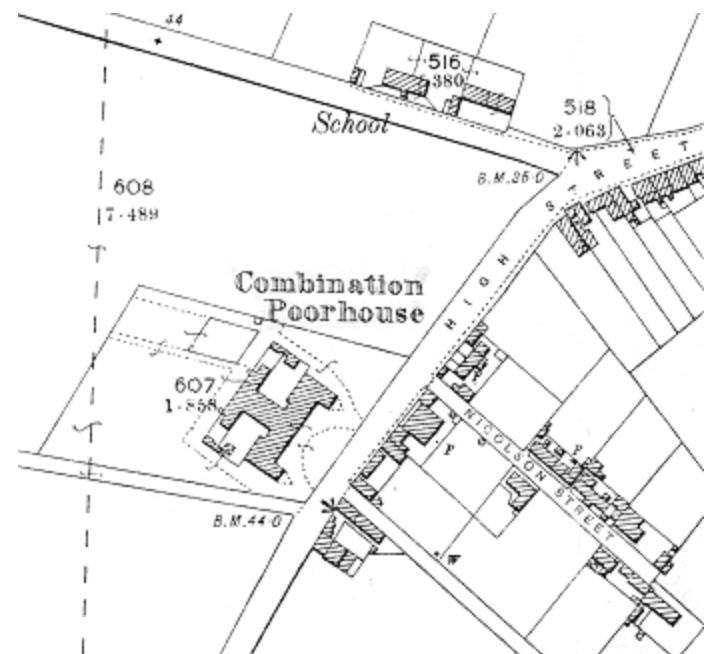Diary of a Victorian Shopkeeper, 3rd December
The site of the Kirkwall poorhouse
There follows the eighth of ten installments of the Victorian journal of Margaret Kirkness, cofounder of our family business. If you have not yet read the story of this document’s discovery, I suggest you do so before proceeding.
After James’s arrest at Granny Groatie’s funeral, I returned to the apartment and flung myself down on the sofa. Tears did not fill my eyes, nor could I utter a word of anguish. So shocked was I by this calamity that stunned silence was my only response. After I know not how long, I started to become aware of sounds from elsewhere in what had been a peaceful, happy home until the tumultuous events of these past days. In the lobby the children played boaley. Through in the kitchen, my brother Andrew talked quietly with Mary the servant girl.
Presently Mary came into the parlour, a cup of tea in her hand. ‘This may revive you,’ she said, and stood, examining me solicitously. For want of anything better to do, I drank the tea, and immediately started to feel better.
I sat up. ‘It strikes me,’ I said, ‘that when we don’t know what to do, we must resort to routine. I will open the shop.’
‘Are you sure?’ she said. ‘After the shock you had?’
‘It’s because of the shock I must do it,’ I said. ‘Seeing the happy faces of our customers as I wrap their purchases will be capital for restoring my spirits.’
Alas, after an hour with the gas lamps lit in the windows, and the counter polished to a gleam, I still had not seen a single customer. Occasionally passersby would pause outside to peer in as if I were a caged animal. I heard one woman say to her friend, ‘They’re nothing but common criminals.’ And the reply came, ‘We’ll not shop there again. This is the end of the Kirknesses.’ So when at last the doorbell sounded, my heart leapt with relief – and was immediately crushed, when I saw the dark figure of Henrietta, Countess of Culsh, on my brigstone.
‘I won’t come in,’ she said, her nose in the air. ‘I’m simply informing you that your husband has been arraigned for 9am tomorrow, 25th December.’
‘Very kind of you, I’m sure,’ I said, through gritted teeth.
She looked around the shop with gloating triumph. ‘So by noon all of this…will be mine!
I gasped.
‘Perhaps,’ she continued, ‘I could find employment for you as a cleaner or scullery maid. The summer guests will need someone to empty their chamber pots. And Mr Kirkness could work as a porter or…but no: he won’t be free to work anywhere for a very long time.’
And she was gone. I fear my self-possession disappeared at that moment too, for suddenly I was filled with a burning rage. Not just at the countess, but at James, for having been so stupid as to enter into some criminal venture and so lose our family home. I flew out of the door and across Broad Street, and within seconds was at the side of the tollbooth, underneath the high barred window that (as I knew from my own incarceration) gave into the jail cell.
‘James Kirkness!’ I shouted at the bars. ‘You have ruined everything! Your gislessness will send your wife and children to the poorhouse – and you to jail!’
From inside I could hear a scrabbling sound as James climbed onto the bench to get closer to the window. Then came his anguished voice: ‘Maggie, forgive me,’ he cried. ‘All I wanted was to keep our customers happy by finding them something a little special.’
‘By making them happy, you have broken my heart,’ I replied.
‘I’m innocent,’ he called, his voice cracking. ‘Ask Nathan Goldberg, he knows everything.’
Suddenly a hand gripped my shoulder and whirled me around. It was Inspector Crambo.
‘I advise you to desist forthwith, Mrs Kirkness,’ he barked. ‘Otherwise I may have to charge you with witness interference.’
‘He’s not a witness,’ I replied. ‘He’s my husband.’
‘He’s a smuggler and a villain,’ said Rosey, slinking out from behind Crambo’s ample bulk.
I looked from one to the other. ‘There’s something I must ask,’ I said. ‘How did you know I was here? And how did you know I was visiting Granny Groatie, the morning after she died?’
Crambo ran a finger along the preposterous thin moustache that lined his fleshy lip. ‘We are the Kirkwall Constabulary. We have our sources.’
At that moment, a small figure in a shabby uniform emerged from the shadow of the mercat cross. ‘Thanks for the enterteenment, ye gowks,’ said the countess’s servant boy. ‘And thanks for the copper, coppers.’
He tossed up a shiny penny so it glinted in the glow of the streetlamp. Then he caught it, turned, and vanished into the darkness.
To be continued.
A new Combination Poorhouse for Orkney was built on the western edge of Kirkwall, opening in 1883. This augmented and to an extent replaced a series of smaller poorhouses throughout the isles, all of which can be read about on this fascinating site: https://workhouses.org.uk/Orkney/ The building is still in use as St Rognvald’s House care home, testament to the foresight and construction skills of the Victorians.
This diary appeared in The Orcadian on 6th December 2023. Or at least it was meant to. But this was the historic week when the freight company tasked with delivering the papers from its printers in Scotland to its readers in Orkney LOST them all…repeatedly. So here we are on Sunday, still without sight of last week’s paper. I’m sure it will turn up eventually. Meanwhile, the Margaret Kirkness story must be told!
A new diary appears weekly. I post them in this blog a few days after (usually!) each newspaper appearance, with added illustrations., and occasional small corrections or additions.

